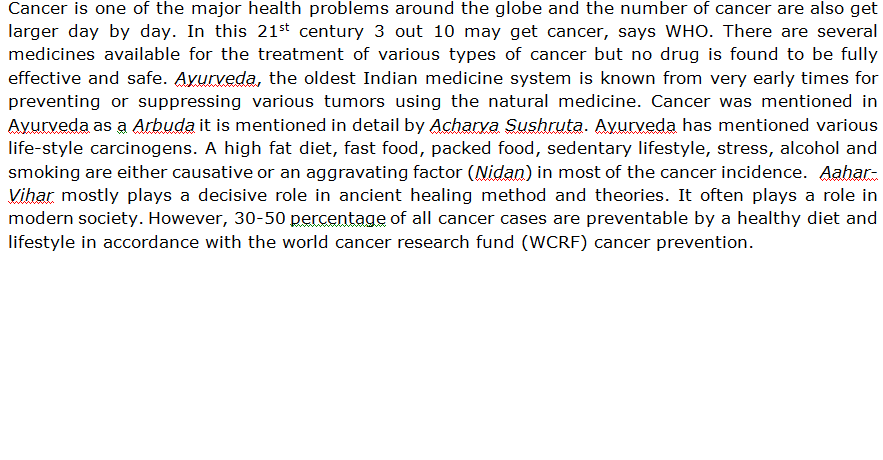Diet and lifestyle for the prevention of the cancer care
DOI:
https://doi.org/10.21760/jaims.v6i01.1187Keywords:
Cancer, Arbuda, Aahar, ViharAbstract
Cancer is one of the major health problems around the globe and the number of cancer are also get larger day by day. In this 21st century 3 out 10 may get cancer, says WHO. There are several medicines available for the treatment of various types of cancer but no drug is found to be fully effective and safe. Ayurveda, the oldest Indian medicine system is known from very early times for preventing or suppressing various tumors using the natural medicine. Cancer was mentioned in Ayurveda as a Arbuda it is mentioned in detail by Acharya Sushruta. Ayurveda has mentioned various life-style carcinogens. A high fat diet, fast food, packed food, sedentary lifestyle, stress, alcohol and smoking are either causative or an aggravating factor (Nidan) in most of the cancer incidence. AaharVihar mostly plays a decisive role in ancient healing method and theories. It often plays a role in modern society. However, 30-50 percentage of all cancer cases are preventable by a healthy diet and lifestyle in accordance with the world cancer research fund (WCRF) cancer prevention.
Downloads
References
Pandey G. Anticancer herbal drugs of India with special reference to Ayurveda. New Delhi: Sri Satguru Publications; 2002:18–121.
Prasad G.C. Concept of cancer in Ayurveda, Varanasi, Banaras Hindu University;221 005.
Sharma PV. Charaka Samhita. Varanasi: Chaukhamba Orientalia;1985.
Bhishagratha KL. Sushruta Samhita. Varanasi: Chaukhamba Orientalia; 1991.
Bhishagratha KL. Sushruta Samhita. Varanasi: Chaukhamba Orientalia; 1991.
Prasad GC. Studies on cancer in Ayurveda and its management. JRAS 1987; 3:147–67.
Singh RM. An assessment of ayurvedic concept of cancer and a new paradigm of anticancer treatment in Ayurveda. J Altern Complement Med 2002; 8:609–14
Sastry JLN. Introduction to oncology, cancer in Ayurveda. Varanasi: Chaukhambha Orientalia; 2001. p. 1–24. Bhishagratha KL. Sushruta Samhita. Varanasi: Choukhamba Orientalia; 1991.
Sastry JLN. Introduction to oncology, cancer in Ayurveda. Varanasi: Chaukhambha Orientalia; 2001. p. 1–24.
Thatte U, Dhahanukar S. Ayurveda, the natural alternative. Sci Today 1991;2001:12–8
Sharma PV. Charaka Samhita. Varanasi: Choukhamba Orientalia;1985.
Sharma PV. Charaka Samhita. Varanasi: Choukhamba Orientalia;1985
Scharfenberg, K., Wagner, R. & Wagner, K.G. The cytotoxic effect of ajoene, a natural product from garlic, investigated with different cell lines. Cancer Letters, 1990, 53(2-3), 103.
Widodo, N., Kaur, K., Shrestha, B.G., Takagi, Y., Ishii, T., Wadhwa, R. & Kaul, S.C. Selective killing of cancer cells by leaf extract of Ashwagandha: Identification of a tumor-inhibitory factor and the first molecular insights to its effect. Clinical Cancer Research, 2007, 13(7), 2298-2306.
Jeurissen, S.M., Punt, A., Delatour, T. & Rietjens, I.M. Basil extract inhibits the sulfotransferase mediated formation of DNA adducts of the procarcinogen 1’-hydroxyestragole by rat and human liver S9 homogenates and in HepG2 human hepatoma cells. Food and Chemical Toxicology, 2008, 46, 2296-2302.
Scharfenberg, K., Wagner, R. & Wagner, K.G. The cytotoxic effect of ajoene, a natural product from garlic, investigated with different cell lines. Cancer Letters, 1990, 53(2-3), 103.
Murphy, E.A., Davis, J.M., McClellan, J.L., Gordon, B.T. & Carmichael, M.D. Curcumin’s effect on intestinal infl ammation and tumorigenesis in the ApcMin/+ Mouse. Journal of Interferon & Cytokine Research. 2011;31(2):219-226
Spinella, F., Rosano, L., Decandia, S., Di, C.V., Albini, A., Elia, G., Natali, P.G. & Bagnato, A. Antitumor effect of green tea polyphenol epigallocatechin-3-gallate in ovarian carcinoma cells: Evidence for the endothelin-1 as a potential target. Experimental Biology and Medicine, 2006, 231, 1123.
Dhama, K., Chauhan, R.S. & Singhal, L. Anti-cancer activity of cow urine: Current status and future directions. International Journal of Cow Science, 2005, 1(2), 1-25
Lin, J.G., Chen, G.W., Li, T.M., Chouh, S.T., Tan, T.W. & Chung, J.G. Aloe-emodin induces apoptosis in T24 human bladder cancer cells through the p53 dependent apoptotic pathway. Journal of Urology, 2006,175(1), 343-347.
Das, I., Chakrabarty, R.N. & Das, S. Saffron can prevent chemically induced skin carcinogenesis in Swiss albino mice. Asian Pacific Journal of Cancer Prevention, 2004, 5, 70-76.
Khachik, F., Beecher, G.R. & Smith, J.C.Jr. Lutein, lycopene, and their oxidative metabolites in chemoprevention of cancer. Journal of Cellular Biochemistry, Supplement, 1995, 22, 236-246.
http://www.carakasamhitaonline.com/mediawiki-1.32.1/index.php/Chikitsa_Sthana















